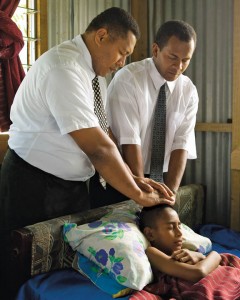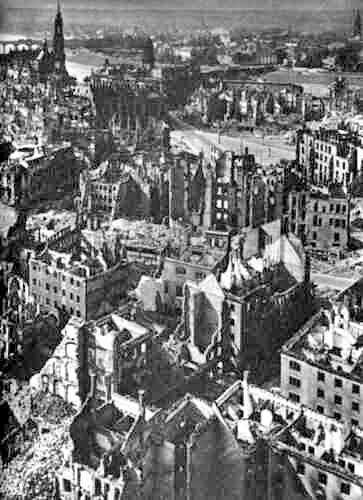February 13, 1945, is an unforgettable day in the lives of thousands of people who were living in Dresden, Germany. World War II was in full fury, with armed forces on all sides pushing towards the German borders trying to send this terrible war.
We felt quite safe in our city of Dresden, the “Florence on the Elbe,” with its many cultural, historic, and architectural treasures. Surely no one would try to destroy these. There was no heavy industry in the region, and this late in the war the population consisted primarily of women, children, and the elderly. However, burgeoning numbers of wounded and sick and thousands of refugees arrived daily from the German settlements beyond the Polish border. Even though all the other major cities of Germany had experienced numerous air raids, Dresden had been spared this terrible destruction.
 It was 10:30 that February night when we first heard the dreadful sounds of the sirens and the roar of hundreds of planes and the explosions of the first bombs. When my father looked outside, he noticed strange-looking lights in the shape of Christmas trees lighting the dark sky and the darkened city. These were the flares used to guide the bombers.
It was 10:30 that February night when we first heard the dreadful sounds of the sirens and the roar of hundreds of planes and the explosions of the first bombs. When my father looked outside, he noticed strange-looking lights in the shape of Christmas trees lighting the dark sky and the darkened city. These were the flares used to guide the bombers.
We lived on the fourth floor of an apartment building and quickly realized that we needed to get downstairs, to the basement, which served as our bomb shelter. The first air raid lasted about forty-five minutes, and many homes in our neighborhood were set ablaze. But the area hardest hit was the inner city, where every building seemed to be engulfed in flames. For the time being, we seemed to be safe, but with the electricity, gas, and all communications cut off, we decided to remain in the basement for the rest of the night.
Around 1:30 A.M., we realized that the planes had returned and that bombs were exploding all around us. Would a bomb hit our house? Would only some or any of us still be alive in one minute or ten minutes or when this air raid ended? It was a terrifying experience! But when the silence finally returned, we were all still alive.
We were alive; however, we were trapped in the basement. One of the first bombs of the second air raid hit our corner house at an angle, setting the ground floor on fire so that the building started burning form the bottom upward. The stairway, our only exit, was already blocked by the fire. The only way out was a hole in our basement wall connecting the basement with the house next door. The hole had been made for this very purpose, but it was barely big enough to crawl through. We couldn’t take anything with us. Our family and an older couple who lived on our floor managed to escape through this hole.
Most of the homes in our area of the city were now destroyed or burning, and the few that remained would soon be on fire. We all realized that we needed to get away from the burning houses immediately! Walking on the streets looked very dangerous because a firestorm with the force of a hurricane was raging, sending thousands of sparks and burning objects flying through the air, fueling and spreading the fires. In the streets, there were also many huge bomb craters adding to the danger.
Once outside, we gathered as a family and quickly held a council. My family consisted of my parents, my two older sisters, my twin sister, and myself. It was imperative that we not get separated as we set out to reach the Elbe River. The Elbe with its wide banks would be a perfect haven from the fire and the smoke that was starting to sting our eyes.
For the last time, we all looked at our house and all that we owned in this life, knowing that the flames would soon reach the upper level. We lived on a very nice wide street leading directly to the river, which was about four blocks from where we stood. For safety, we did not all walk together. My father took one of my older sisters and my twin sister and began to lead the way. My mother, my oldest sister, and I were to follow as closely as possible. As my father started walking, he headed towards a narrow side street which led directly to our goal, to the river. Mother stopped, not wanting to follow down the narrow, burning street and began calling Dad to try to persuade him to turn around and take the more direct route along our street, which seemed so much safer and quicker. But due to the firestorm, Dad could not hear her plea, and he continued walking along the narrow side street.
With each passing second, the distance between us increased, but mom was still not willing to abandon her plan. Then I heard my older sister plead with her, “Mom, let’s follow Dad; he holds the Priesthood!” With this reminder, we started to move quickly, trying to catch up with Dad, who led us safely in a roundabout way down to the river. We followed several other people into an old hospital building, where we could finally sit down, rest, wait out the night, and be protected from the firestorm and its terror.
After we had been there a short time, a neighbor lady entered the building. She and her elderly husband had lived on the top floor of our building for many years, and they had become our very good friends. But now she was alone, extremely upset and crying. As soon as she regained her composure, she told us that after she and her husband had left our burning building, they decided to walk straight down the wide street to the river. Her husband, tall and slender, walked very quickly leading the way, but she, somewhat short and heavy, could not follow so quickly, and lagged behind. Suddenly she saw her husband burnt alive in front of her eyes. Unknown to anyone, liquid phosphorous from one of the bombs had covered the street. It could not be seen but was immediately ignited whenever anyone stepped on it. There was nothing she could do to save her husband, she could only turn around and save herself.
We did what we could to comfort her and then said a silent prayer of thanksgiving that we had been spared. If we had not followed our father, we would have walked right into that liquid phosphorous. I learned that night how important it is that we follow the priesthood. . . .
We really did not know where to go, but we decided to stop at the home of some Church members to let them know that we were alive. We arrived at their house in Leuben around 9:00 A.M., just at the end of another air raid. The Düennebeil family greeted us with tears of joy in their eyes to see us alive and took us into their apartment, where we enjoyed the luxury of a bath and a bed to sleep in and an opportunity for some much needed rest.
Sister Düennebeil , her son Dieter, and Grandpa Düennebeil , with their big hearts and love for the gospel and their fellowmen, had opened their home to several of us homeless families. Their three-bedroom apartment had welcomed the Deus family—a mother, grandmother, and four children—and Sister Sawatzki and her two young children—both refugee families from the East—and now our family of six. At night, to make things a little less crowded, my father slept on the couch at the home of an older couple, Brother and Sister Meyer, who lived close by. My mother and one of us children walked a few blocks to the home of an older sister who had an extra twin bed. Everyone else slept wall-to-wall on Düennebeil’s living room floor, thanks to some more good neighbors who helped with the bedding. . . .
After about two weeks, a knock came to the door. A good friend of ours asked us to follow him. Herr Hubold was not a member of the Church, but his wife and two children were baptized and were very active in our little branch. He also attended meetings quite often. He was on the board of directors of a private housing development which had survived the bombing. After that terrible night in Dresden, the housing board held a special meeting. Several families who had small children had temporarily left their apartments in order to seek safety in the country or with relatives in other parts of Germany. The question was raised, “Should not some homeless families, even if only temporarily, be invited to occupy these empty apartments?” But how does one select a handful of families out of tens of thousands in need? Herr Hubold asked for permission to invite his friends to move into these vacant dwellings. Permission was granted, and we and three other LDS families who had lost everything had a place to call home, fully furnished. . . .
During World War II, we always had enough to eat, and we still had enough of a variety of things to eat. Things were rationed, but we still had enough sugar, we still could buy some chocolate, and we still had meat at least for Sundays or once during the week. We always had enough bread, and we always had enough potatoes. I never remember being hungry. But after the war, when the Communists, the Russians, came in, then we really went without. We ate bread with nothing on it and sometimes potatoes. There just wasn’t enough to eat. I can remember going to bed hungry at night. When I got up from the table, I never really felt like I had had enough to eat.
After about 1948, when the food shipments came from the Church, then, at least, we had enough potatoes and bread again. Those food shipments were very much appreciated. They really saved our lives. That is one thing I will never forget.
Dorothea Speth Condie, Behind the Iron Curtain: Recollections of Latter-day Saints in East Germany, 1945–1989, p32–37.
Twitter •


 Watch a video about the restoration of the gospel on lds.org
Watch a video about the restoration of the gospel on lds.org
What price am l willing to pay for living in a peaceful enviroment and having the Gospel of Jesus Christ in my life. Thank you Sister Condie for this beautiful article. I pray that Peace can be in all parts of world where children of Heavenly Father are seriously looking for peace.